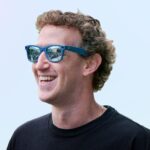In Melbourne, masked men set fire to a historic synagogue. In Sydney, a synagogue was defaced with red swastikas spray-painted along the fence, while a daycare was set alight and scrawled with anti-Semitic insults under the cover of night.
A series of anti-Semitic attacks in recent weeks has shaken the Jewish community in Australia, home to the largest proportion of Holocaust survivors outside Israel. There have been no reports of major casualties, but the violence represents a dramatic escalation of tensions reverberating of the war in the Middle East, which has also caused Islamophobic episodes in Australia.
Reports of arson and explicit graffiti have unnerved a nation that prides itself on being a tolerant, multicultural society and where a third of the population was foreign-born.
Now, authorities say they are investigating whether there was international involvement in the attacks in recent months in Sydney and Melbourne, the country’s two largest cities.
The latest attack took place at the Sydney daycare center, which was reported early Tuesday morning. In a statement on TuesdayAustralia’s federal police chief said his agency was investigating whether “foreign actors or individuals” had paid locals in Australia to carry out some of these acts. But he did not give evidence or give more details.
On Wednesday, Prime Minister Anthony Albanese reiterated that investigators were looking into the possibility that some of the perpetrators had acted out of financial incentives rather than ideological motivations.
“It is now unclear who or where the payments come from,” he said.
The specter of foreign involvement has added a new dimension to the anxiety that has been brewing in Australia’s small but deeply rooted Jewish community. Police have not said whether or how the more than half a dozen attacks since October are related.
In December, the Australian Federal Police created a task force to investigate violence and threats against the Jewish community. State police in New South Wales, where most of the attacks occurred in the greater Sydney area, said they arrested and charged nine people in connection with the crimes.
On Wednesday, authorities announced the latest arrest, that of a 33-year-old man in a case of attempted arson and graffiti on January 11, when red swastikas were painted on the fence of a synagogue in Sydney’s Newtown neighborhood . .
State Premier Chris Minns said officials were cracking down on what he called “rampant anti-Semitism and violence in our community.” The crimes, he added, were a “deliberate attempt to strike terror into the hearts of the people who live in this state.”
What made the recent attacks different was their frequency and severity, said Julie Nathan, research director at the Sydney-based Executive Council of Australian Jews, an umbrella organization for Jewish groups in Australia that has been tracking and documenting reports of antisemitism since 1990.
“We’ve had terrible graffiti, vandalism of cars and buildings, but nothing consistent at this level,” he said. “This is every few days.”
The former home of Alex Ryvchin, co-executive director of the ECAJ, was vandalized last week.
Ryvchin said it was evident that the house, which his family had recently moved out of, had been specifically targeted. Part of a duplex, only his former residence had been splattered with red paint, he said. The other half of the building was left intact. Cars in the driveway and out front were vandalized with anti-Jewish insults.
“It was quite heartbreaking to go there and see the walls that I had painted myself, the house that we loved and made so many memories in,” he said.
But Ryvchin said he was not surprised by the incident because it seemed like the natural progression of the increasingly overtly anti-Semitic language and brazen attacks that followed the Hamas-led Oct. 7, 2023, attack on Israel and the ensuing war in Israel. the Gaza Strip.
“We wake up every day and we don’t know what’s going to happen,” he said. “Not just vandalism and harassment, but also bombings.”
The rise in attacks, while worrying, does not presage a broader trend, said Andrew Markus, a professor emeritus at the Australian Center for Jewish Civilization at Monash University, who has tracked Australians’ attitudes toward immigrants and each other in a long-term national survey.
“One small segment, one tiny segment, is causing fear, anxiety and headlines,” he said. “It’s a major issue, but you can’t say there’s been a major change in the attitudes of the Australian public.”





